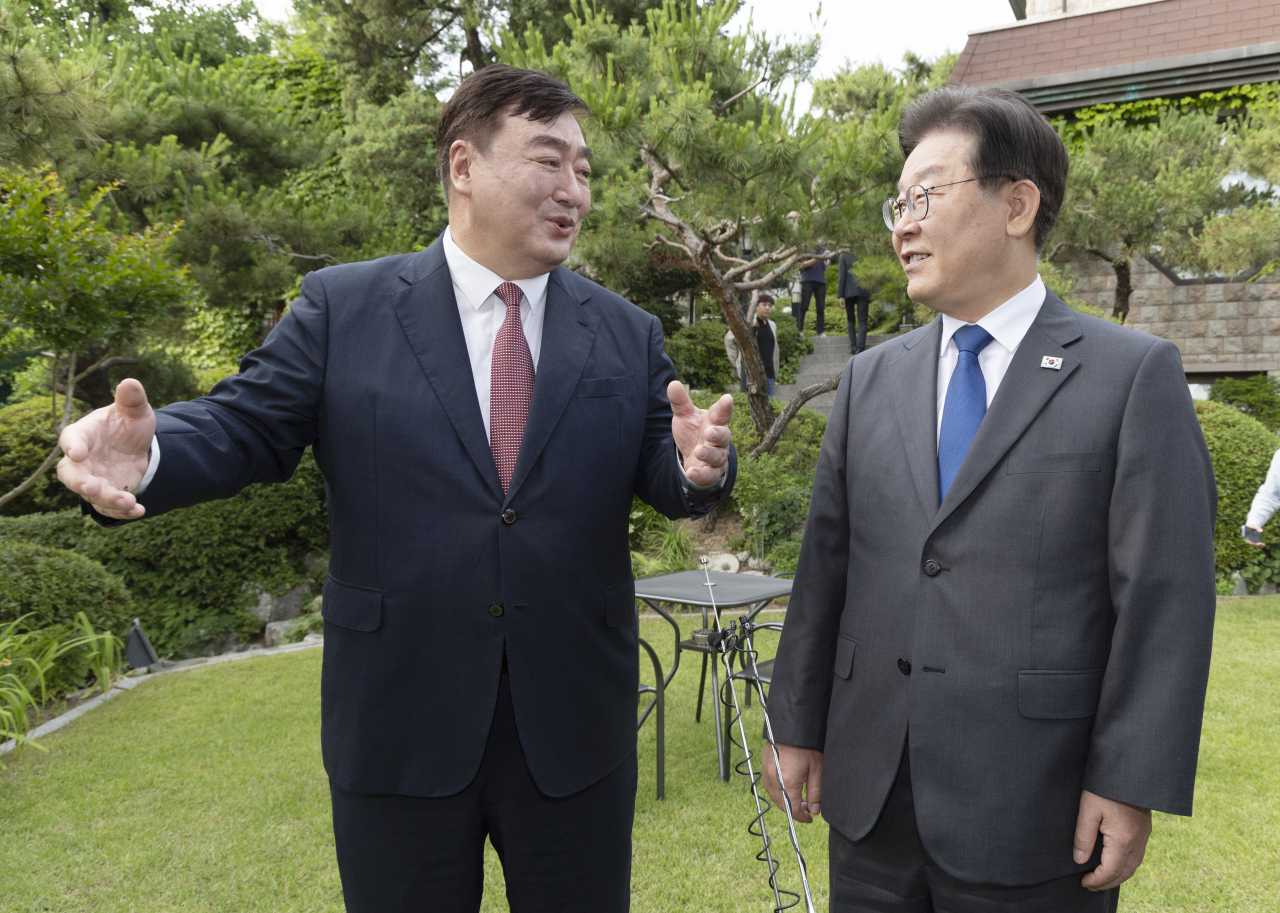Ruling bloc baffled by opposition leader jabbing Yoon with China envoy
South Korean, Chinese foreign ministries each summon respective ambassadors
By Kim ArinPublished : June 11, 2023 - 16:05

South Korean main opposition Democratic Party of Korea leader Rep. Lee Jae-myung has stoked rebuke for backing Chinese ambassador Xing Haiming’s criticism of South Korean President Yoon Suk Yeol’s foreign policy last week.
At a dinner event with Xing at the ambassador’s residence on Thursday, Lee suggested that the relationship between South Korea and China has soured since Yoon administration came into office.
“The latest developments in international politics and economy appear to be having a significant impact on our 31 years of bilateral ties,” he said.
“There are concerns the degree of trust and respect between the people of the two countries have dwindled recently,” he said, adding that there need to be “extra efforts” on the government level to restore mutual confidence.
Many in the National Assembly, mainly ruling People Power Party lawmakers, criticized Democratic Party leader Lee for failing to represent national interests by joining the Chinese ambassador in his blame of the South Korean government.
Rep. Ahn Cheol-soo, a former presidential contender, said Lee was stepping out of his place to insinuate that the Yoon administration was responsible for a setback in South Korea-China ties.
“Lee essentially went along with Ambassador Xing in condemning our government,” said Ahn, who is on the National Assembly foreign affairs committee. “He should know that political attacks should not extend beyond our borders.”
Rep. Kim Gi-hyeon, who heads the ruling People Power Party, said Lee’s speech at his dinner with the Chinese diplomat exemplified how he was “willing to bow to China” if it meant he could denounce Yoon. He also accused the opposition leader of following the previous President Moon Jae-in’s pro-China tendencies.
At Thursday’s dinner, Lee said South Korea and China should join efforts in protesting Tokyo’s plan to release approximately 1.32 million tonnes of wastewater stored at destroyed Fukushima Nuclear Power Plant. The wastewater will be treated and diluted, and its release gradual over the next 20 to 30 years, the Japanese government has said.
“As neighboring countries, I would like us to raise our voices if possible and come up with measures to respond to this problem together,” said Lee, who has been fiercely critical of Yoon administration’s push to mend ties with Japan along with the rest of his party.
Lee also told the Chinese ambassador that South Korea “actively supports the ‘One China’ principle,” apparently diverging from Yoon’s stance. The South Korean president said tensions surrounding Taiwan were a global issue and not just China’s in an April interview with Reuters.
In a speech that followed Lee’s, Xing echoed the Democratic Party leader, saying it wasn’t Beijing that was responsible for its deteriorating relationship with Seoul.
“Our bilateral relationship is facing many difficulties at the moment. Frankly, the responsibility does not lie with China,” he said.
Xing said it was “external factors” such as the changing international landscape and the US pressure campaign against China that were challenging its relations with South Korea. He then called on South Korea to “stay out of external factors when dealing with China.”
“In a situation where the US is pressuring China with all its might, some are betting that the US will win and China will lose,” he said. “What I can say for sure is that those who bet now on China's defeat will surely regret it later.”
On Taiwan, he said he would like the South Korean side to “clearly respect China’s core interests.”
The Chinese Foreign Ministry on Sunday filed a complaint with South Korean Ambassador to China Chung Jae-ho over the South Korean Foreign Ministry's summoning of Xing two days prior.
In calling in Xing on Friday, Seoul’s Vice Foreign Minister Chang Ho-jin said the Chinese ambassador’s criticism of South Korea was “contradicting diplomatic customs” and “untrue and unforgivable.”
Despite pushback from Seoul, Chinese Foreign Ministry spokesperson Wang Wengbin endorsed the remarks made by Xing, reiterating in Friday’s press conference that the “current difficulties and challenges in the China-ROK relations are not caused by China.”
Yoon once again signaled a stronger alignment with Washington and Tokyo in his new national security strategy unveiled last week.
In the 42-page document, the length of the section indirectly or directly addressing China was about a third of that on Japan. While the last three South Korean administrations called China a “strategic cooperation partner” in their respective strategies, those words were not used to refer to China by the Yoon administration.
Yoon and Japanese Prime Minister Fumio Kishida held two consecutive summit talks in Tokyo and then in Seoul, before meeting again at the Group of Seven summit in Hiroshima last month. He and the Chinese President Xi Jinping have yet to follow up their first summit in November last year on the sidelines of the Group of 20 summit.



















![[Today’s K-pop] Treasure to publish magazine for debut anniversary](http://res.heraldm.com/phpwas/restmb_idxmake.php?idx=642&simg=/content/image/2024/07/26/20240726050551_0.jpg&u=)